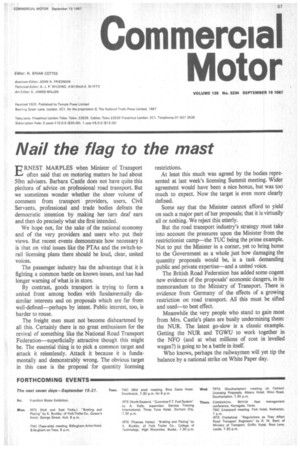Nail the flag to the mast
Page 39

If you've noticed an error in this article please click here to report it so we can fix it.
ERNEST MARPLES when Minister of Transport often said that on motoring matters he had about 50m advisers. Barbara Castle does not have quite this plethora of advice on professional road transport. But we sometimes wonder whether the sheer volume of comment from transport providers, users, Civil Servants, professional and trade bodies defeats the democratic intention by making her turn deaf ears and then do precisely what she first intended.
We hope not, for the sake of the national economy and of the very providers and users who put their views. But recent events demonstrate how necessary it is that on vital issues like the PTAs and the switch-torail licensing plans there should be loud, clear, united voices.
The passenger industry has the advantage that it is fighting a common battle on known issues, and has had longer warning of what is in store.
By contrast, goods transport is trying to form a united front among bodies with fundamentally dissimilar interests and on proposals which are far from well-defined—perhaps by intent. Public interest, too, is harder to rouse.
The freight men must not become disheartened by all this. Certainly there is no great enthusiasm for the revival of something like the National Road Transport Federation—superficially attractive though this might be. The essential thing is to pick a common target and attack it relentlessly. Attack it because it is fundamentally and demonstrably wrong. The obvious target in this case is the proposal for quantity licensing restrictions.
At least this much was agreed by the bodies represented at last week's licensing Summit meeting. Wider agreement would have been a nice bonus, but was too much to expect. Now the target is even more clearly defined.
Some say that the Minister cannot afford to yield on such a major part of her proposals; that it is virtually all or nothing. We reject this utterly.
But the road transport industry's strategy must take into account the pressures upon the Minister from the restrictionist camp—the TUC being the prime example. Not to put the Minister in a corner, yet to bring home to the Government as a whole just how damaging the quantity proposals would be, is a task demanding public and private expertise—and a united voice.
The British Road Federation has added some cogent new evidence of the proposals' economic dangers, in its memorandum to the Ministry of Transport. There is evidence from Germany of the effects of a growing restriction on road transport. All this must be sifted and used—to best effect.
Meanwhile the very people who stand to gain most from Mrs. Castle's plans are busily undermining them: the NUR. The latest go-slow is a classic example. Getting the NUR and TGWU to work together in the NFO (and at what millions of cost in levelled wages?) is going to be a battle in itself.
Who knows, perhaps the railwaymen will yet tip the balance by a national strike on White Paper day.




































































































































